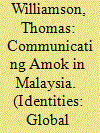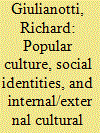|
|
|
Sort Order |
|
|
|
Items / Page
|
|
|
|
|
|
|
| Srl | Item |
| 1 |
ID:
078253


|
|
|
|
|
| Publication |
2007.
|
| Summary/Abstract |
This article analyzes the different messages communicated in Malaysia by violent acts labeled amok. In the colonial period, English-language uses of the term represented the presence of an anti-modern remnant among the peninsula's Malay population, one that led to a medico-legal understanding of individualized violence. Malay-language uses of amok represented, in contrast, the presence of modern changes amid the collective peninsular society. These two vectors of interest combined in the post-colonial period, where amok became a primary ingredient for analyzing Malaysian politics and national security, from the pivotal urban rebellion of May 13, 1969, to the Reformasi protests of 1998. Critically reexamining these representations of amok helps us to rethink the efficacy and power of violent acts in Malaysia and elsewhere.
|
|
|
|
|
|
|
|
|
|
|
|
|
|
|
|
| 2 |
ID:
078251


|
|
|
|
|
| Publication |
2007.
|
| Summary/Abstract |
In recent decades, ethnicity has received increasing academic attention - and popular acceptance - as a core aspect of identity and one that is particularly relevant to immigrants. But is this notion of ethnicity salient to the immigrants themselves? This article provides a set of quantitative snapshots of the way new arrivals to the United States identify themselves and their children. The data - a set of annual surveys of recent refugee arrivals - suggest that in response to specific questions about "ethnicity," newcomers often provide what from American perspectives are not "ethnic" responses. In particular, race and religion are frequently offered as ethnic identity. Furthermore, nationality can also override ethnicity. Parents, for example, sometimes categorize recent United States-born children as ethnically "American" even though the rest of the family retains its previous non-United States identity. Such identity choices reveal much about the starting point of migrant adjustment. They are also invaluable for the broader analysis of the logic, history, contingencies, and internal tensions of United States - and Euro-American - notions of ethnicity
|
|
|
|
|
|
|
|
|
|
|
|
|
|
|
|
| 3 |
ID:
078252


|
|
|
|
|
| Publication |
2007.
|
| Summary/Abstract |
This essay examines the lives of non-Indians who live as monastics in Rishikesh, India. As transmigrants, they cross national borders and occupy transnational social fields. However, they neither maintain a home outside of India nor use the language of displacement to describe their experience. They speak instead of feeling "at home" in India and of finally finding their place, thus unsettling the emphasis on displacement in models of transmigrant identities. I explore how Foreign Swamis experience India as home and point to certain characteristics that make India eligible to become "home" to non-Indians: discursive constructions of spiritual India, low cost of living, institutional support for the monastic life, and the Hindu doctrine of transmigration of the soul. Foreign Swamis are unusual, even radical, transmigrants in that most move from rich to poor country, with ascetic rather than worldly aspirations, and after renouncing family, employment, and country. Yet their narratives may prompt us to ask new questions about other kinds of transmigrants: What other kinds of people might find home through migration? What makes a place eligible to become home to what kinds of people, and, finally, what other kinds of homes might be possible
|
|
|
|
|
|
|
|
|
|
|
|
|
|
|
|
| 4 |
ID:
078249


|
|
|
|
|
| Publication |
2007.
|
| Summary/Abstract |
This article explores the controversy surrounding Borat Sagdiyev - the fictitious Kazakhstani reporter whose foibles mock Kazakhstan in particular and post-Soviet culture in general. With his appearances on Da Ali G Show, Sacha Baron Cohen's Borat persona long ago became the bête noire of the Kazakhstani government. However, when Borat was selected to host the MTV Europe Music Awards, the dispute over Borat's authenticity as a Kazakhstani became an international incident. In response to his negative portrayal of Kazakshilik (Kazakhness) through the deterritorialized medium of MTV, the government of President Nazarbayev threatened Baron Cohen with legal action and brought down his web site borat.kz. Baron Cohen immediately responded in character via his new domain (.tv) and defended the actions of Kazakhstan, thus fuelling the controversy. The ongoing feud has prompted an interesting postmodern praxis - one in which a fictional persona and national government can carry on a mass-mediated dialogue. As I document the details of this ongoing conflict on the global and local levels, I seek to explain the changes in the international system which have enabled this intriguing paradox. In doing so, I attempt to draw some larger conclusions on the importance of protecting national identity in the postmodern era, especially from threats (both internal and external) which weaken a country's global brand
|
|
|
|
|
|
|
|
|
|
|
|
|
|
|
|
| 5 |
ID:
078250


|
|
|
|
|
| Publication |
2007.
|
| Summary/Abstract |
The article examines the construction of critical, resistant identities among supporters of the powerful Scottish football club, Rangers. The analysis is underpinned by two general arguments relating to identity construction: (1) the need to examine carefully the cultural politics of relatively advantaged groups within the field of popular culture and (2) the need to explore how forms of cultural resistance and contestation are focused particularly on relations within the popular culture, rather than on forms of determination by the wider societal order. The article draws heavily on substantial fieldwork with Rangers supporters in the UK and overseas. The findings highlight the complex and contingent relationships between popular culture and broader societal forces, as illustrated by the diverging arguments of Rangers fans on the legitimacy of ethno-religious and market-focused identities within football
|
|
|
|
|
|
|
|
|
|
|
|
|
|
|
|
|
|
|
|
|